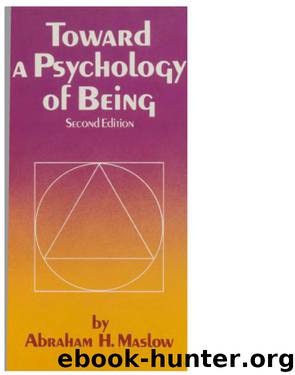Toward a Psychology of Being by Abraham H. Maslow

Author:Abraham H. Maslow
Language: eng
Format: epub, mobi
Tags: psychology, humanistic, being, love
CONCLUDING REMARK
I wish to underscore one main paradox I have dealt with above (number 2) which we must face even if we don’t understand it. The goal of identity (self-actualization, autonomy, individuation, Homey’s real self, authenticity, etc.) seems to be simultaneously an end-goal in itself, and also a transitional goal, a rite of passage, a step along the path to the transcendence of identity. This is like saying its function is to erase itself. Put the other way about, if our goal is the Eastern one of ego-transcendence and obliteration, of leaving behind self-consciousness and self-observation, of fusion with the world and identification with it (Bucke), of homonomy (Angyal), then it looks as if the best path to this goal for most people is via achieving identity, a strong real self, and via basic-need-gratifi-cation rather than via asceticism.
Perhaps it is relevant to this theory that my young subjects tend to report two kinds of physical reaction to peak-experiences. One is excitement and high tension (“I feel wild, like jumping up and down, like yelling out loud”). The other is relaxation, peacefulness, quietness, the feeling of stillness. For instance, after a beautiful sex experience, or esthetic experience or creative furor, either is possible; either continued high excitement, inability to sleep, or lack of wish for it, even loss of appetite, constipation, etc. Or else, complete relaxation, inaction, deep sleep, etc. What this means I don’t know.
Some Dangers of Being-Cognition
The aim of this chapter is to correct the widespread misunderstanding of self-actualization as a static, unreal, “perfect” state in which all human problems are transcended, and in which people “live happily forever after” in a superhuman state of serenity or ecstasy. This is empirically not so, as I have previously pointed out (97).
To make this fact clearer, I could describe self-actualization as a development of personality which frees the person from the deficiency problems of youth, and from the neurotic (or infantile, or fantasy, or unnecessary, or “unreal”) problems ot life, so that he is able to face, endure and grapple with the “real” problems of life (the intrinsically and ultimately human problems, the unavoidable, the “existential” problems to which there is no perfect solution). That is, it is not an absence of problems but a moving from transitional or unreal problems to real problems. For shock purposes, I could even call the self-actualizing person a self-accepting and insightful neurotic, for
this phrase may be defined in such a way as to be almost
synonymous with “understanding and accepting the intrinsic human situation,” i.e., facing and accepting courageously, and even enjoying, being amused by the “shortcomings” of human
nature instead of trying to deny them.
It is these real problems which confront even (or especially) the most highly matured human beings, that I would like to deal with in the future, e.g., real guilt, real sadness, real loneliness, healthy selfishness, courage, responsibility, responsibilit\ for others, etc.
Of course there is a quantitative (as well as qualitative) improvement that comes with higher personality evolvement, quite
apart from the intrinsic satisfaction of seeing the truth rather than fooling oneself.
Download
Toward a Psychology of Being by Abraham H. Maslow.mobi
This site does not store any files on its server. We only index and link to content provided by other sites. Please contact the content providers to delete copyright contents if any and email us, we'll remove relevant links or contents immediately.
Rewire Your Anxious Brain by Catherine M. Pittman(18643)
Talking to Strangers by Malcolm Gladwell(13346)
The Art of Thinking Clearly by Rolf Dobelli(10451)
Mindhunter: Inside the FBI's Elite Serial Crime Unit by John E. Douglas & Mark Olshaker(9318)
Becoming Supernatural by Dr. Joe Dispenza(8200)
Change Your Questions, Change Your Life by Marilee Adams(7758)
Nudge - Improving Decisions about Health, Wealth, and Happiness by Thaler Sunstein(7690)
The Road Less Traveled by M. Scott Peck(7594)
The Lost Art of Listening by Michael P. Nichols(7490)
Mastermind: How to Think Like Sherlock Holmes by Maria Konnikova(7320)
Enlightenment Now: The Case for Reason, Science, Humanism, and Progress by Steven Pinker(7306)
Win Bigly by Scott Adams(7183)
The Way of Zen by Alan W. Watts(6600)
Daring Greatly by Brene Brown(6501)
Big Magic: Creative Living Beyond Fear by Elizabeth Gilbert(5754)
Grit by Angela Duckworth(5604)
Ego Is the Enemy by Ryan Holiday(5413)
Men In Love by Nancy Friday(5232)
The Laws of Human Nature by Robert Greene(5171)
